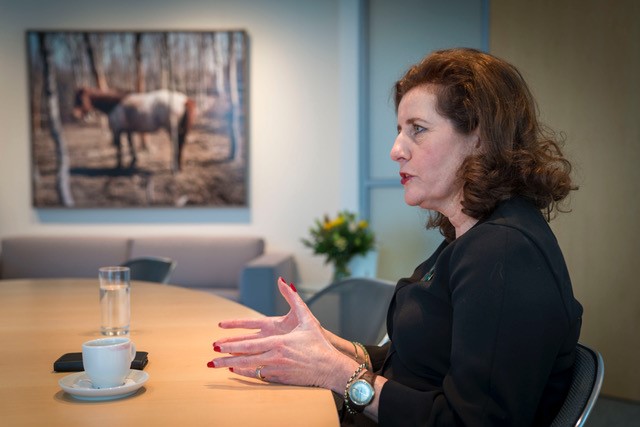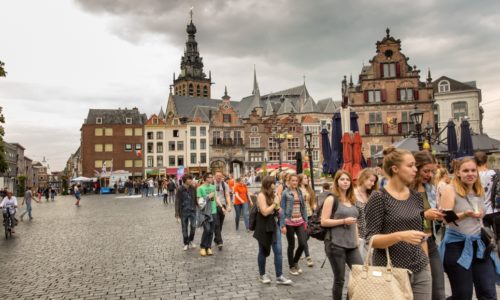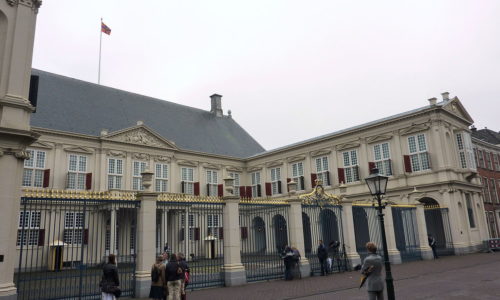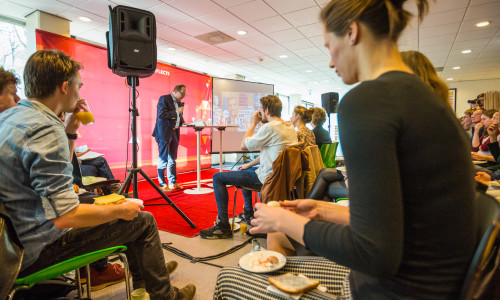‘It’s amazing to be a Minister’
-
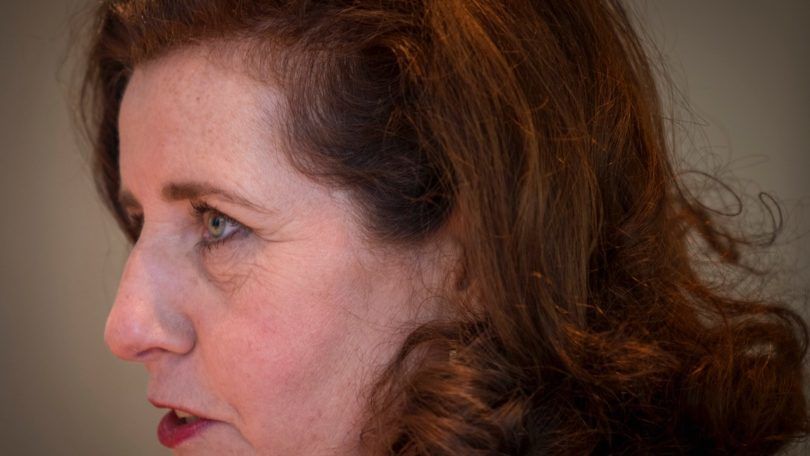 Ingrid van Engelshoven. Photo: Erik van 't Hullenaar
Ingrid van Engelshoven. Photo: Erik van 't Hullenaar
The Minister of Education, Ingrid van Engelshoven, has her roots in Nijmegen. In 1984, she and VOX columnist Peter van der Heiden enrolled together as first-year Political Science students in Nijmegen. Now Van der Heiden gets to interview his former fellow student and D66 Minister. 'With this Minister, Radboud University need not worry about its visibility at the Ministry.'
Is it actually fun, being a Minister?
‘Great fun! Every single day! It’s great to become and be a Minister. I love board work and I eat dossiers for breakfast. Some of my colleagues dread the dossiers you get assigned as a Minister, but I can’t wait to dive in. Plus I really have a thing about education, as a socio-liberal I feel this is the way to create more opportunities for people. Culture is another theme close to my heart, and here too, we finally have some money to spend.’
‘I wasn’t terribly surprised to be asked. I think people who’d been following my career were not surprised to see me on Pechtold’s short list or to find out I’d been appointed Minister in this Cabinet. Of course I was Leader of the Party for a while, and I’d worked as Alderman for Education in The Hague. Being a Minister may be the crowning glory of my career so far, but it isn’t the highlight. This was in 2014, when under my leadership D66 became the largest party of The Hague and beat PVV in what looked for a long time like a neck-to-neck race. I’ll never forget that moment.’
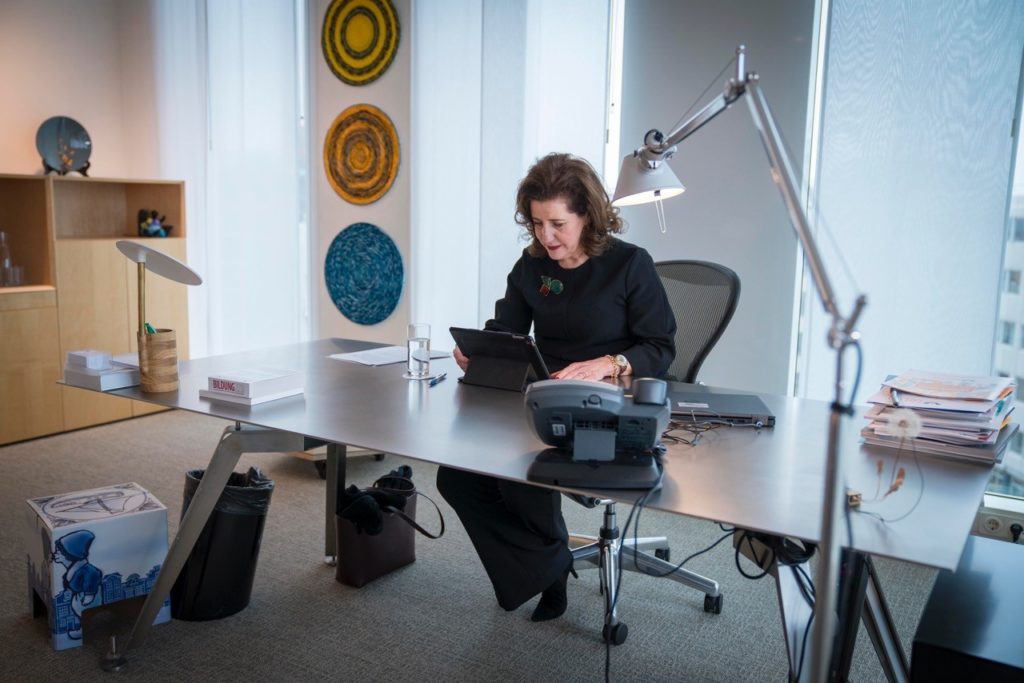
Are there children who dream of becoming political science experts? Or Minister of Education? If there are, Van Engelshoven wasn’t one of them. She wanted to be a psychiatrist, to help people. The only problem was she couldn’t handle blood (‘I can’t even look at a wound’), so Medicine wasn’t an option. Coming as she did from a family with their roots in science it was difficult to convince her parents, in particular her father, that Political Science was a serious study, with real career opportunities.
Why did you choose for Political Science in Nijmegen?
‘A combination of factors. I’d been to school in Belgium – where our family lived – and was actually planning to study Political and Social Sciences in Leuven. But that study programme mostly prepared students for jobs in government and semi-government organisations, and as a Dutch citizen, I would have little chance of getting such a job in Belgium. So I had to choose: take on the Belgian nationality, or study elsewhere. I guess I was attached to my nationality, so I decided to study in the Netherlands. As for Nijmegen, I thought crossing the rivers was too much of a step, and my sister was studying in Nijmegen at the time. My brother was in Eindhoven, so we all moved North at the same time.’
‘Fundamental research has to be strengthened’
I decided to study Political Science because I wanted to work in diplomacy or international collaboration. But as my studies progressed, these ideas dropped to the background and I increasingly became interested in Dutch politics and administration. The discussions about Dutch political movements, Lijphart’s book on pillarization and administrative processes, these things gripped me more than international politics. Still, I found it hard to choose; I would have liked to continue to study all these subjects. What helped in the end was that in my second year I became an active member of D66, which reinforced my connection to Dutch politics.’
All right, so now you’re a Minister. What can the Dutch universities expect from you?
‘Luckily the new coalition agreement has made some additional money available for investing in research: approximately €450 million. I find it very important first of all that this money be used to strengthen fundamental research. It’s terribly worrisome that the private sector is investing less in this form of research. I really hope the industry will feel stimulated by the government’s investment to invest once again. A portion of these €450 million will also go towards implementing the national research agenda.’
According to many, including the Royal Netherlands Academy of Sciences (KNAW) and the House of Representatives, we’ve taken use of English in university education too far.
What do you think about it?
‘I’ve got my own ideas concerning internationalisation in higher education. Study programmes should only be taught in English if the job prospects for graduates are also international. And in that case, the level of English should be very high. I’m also doubtful about the strategy of attracting more students from abroad just to raise student numbers. I understand the interests involved, but it does not serve the quality of education, and internationalisation is supposed to contribute to higher quality. Before the summer I plan to submit a letter on internationalisation to the House, and we’re going to review the budget for higher education, as announced in the coalition agreement.’
Is Nijmegen sufficiently visible as a University?
(She laughs) ‘It certainly is to me! With this Minister Radboud University need not worry about being underrepresented, the Ministry has your interests at heart.’
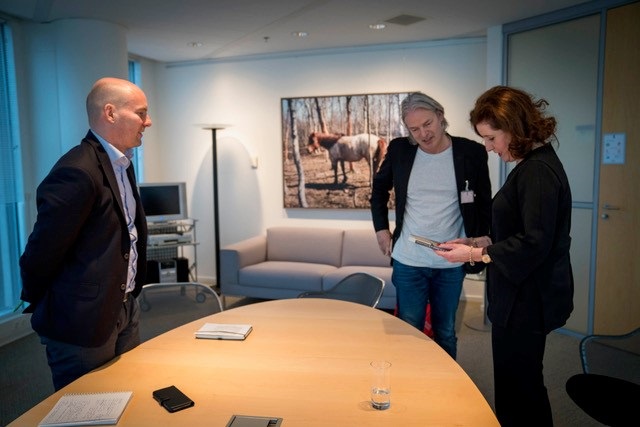
What can students expect from you and what’s your advice to today’s students?
‘I think it’s very important that universities help out students who run into trouble. The university should pay attention to the students’ psychological well-being, and students should be offered more help and support. I can imagine some students struggle with the current ‘bull rush’ system. Our focus has to shift away from quick profits. There has to be more space for students to develop at their own pace. Not everyone can complete a study programme in the appointed time, and we should beware of glorifying those who can. I think we have to consider carefully how we can give this form in our budget, and we’re now discussing the matter with the educational institutions. There are financial limitations, but it’s feasible, without regressing to times when it was normal for students to take twelve years to complete a degree.’
‘I experienced some major slips in my life, and it’s something I wish for everyone’
‘So, what would I advise them? Mostly to look beyond their study programmes. There are so many interesting opportunities for growth outside your study. For example, it really helped me to be politically active in my student days. What I find very important is that students don’t develop a fixed idea of their future career. I never had such a clear idea myself. Instead it’s important to be aware that some choices limit your options. For example, as Minister of Emancipation (my other position), one of the things I find worrisome is the high number of highly educated young women who choose to work part-time (for reasons that remain unclear to me). In doing so they cut themselves off from career opportunities. And, equally importantly, make sure you fail properly a few times. You learn most by going for things that scare you and that may go wrong. I experienced some major slips in my life, and it’s something I wish for everyone.’
